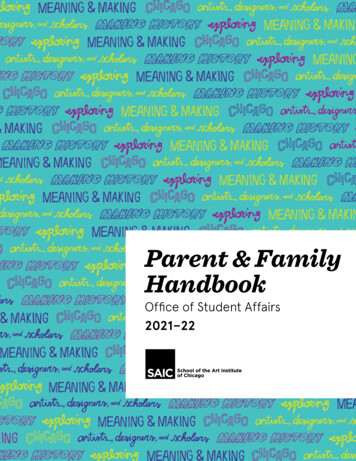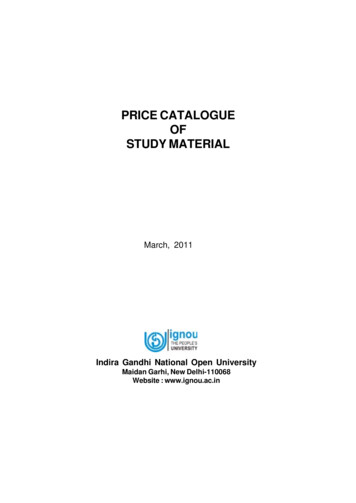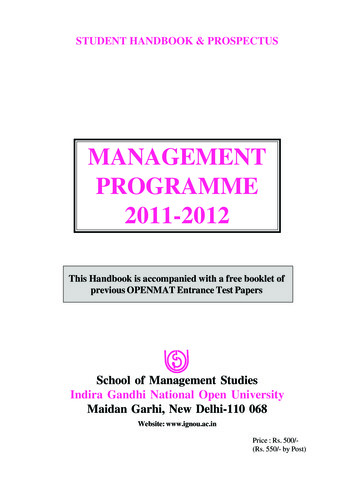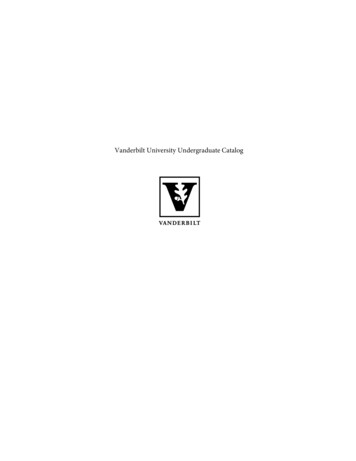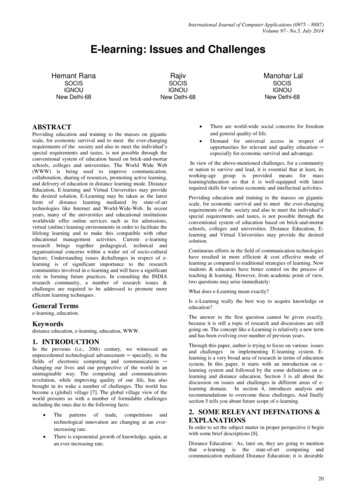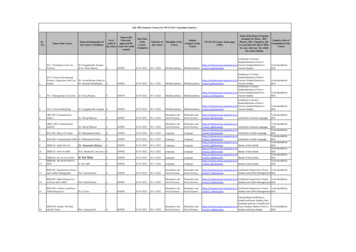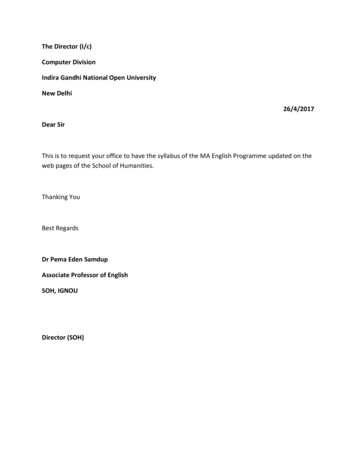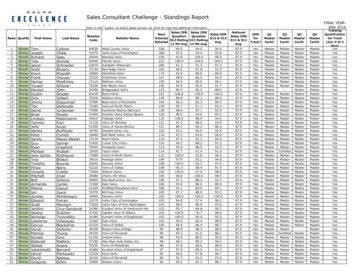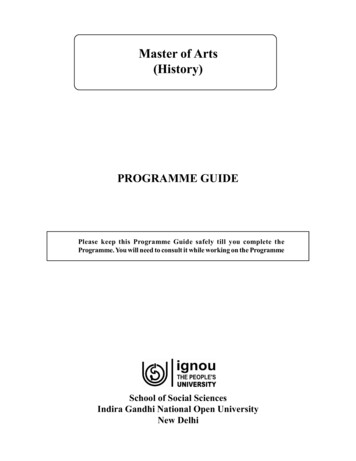
Transcription
Master of Arts(History)PROGRAMME GUIDEPlease keep this Programme Guide safely till you complete theProgramme. You will need to consult it while working on the ProgrammeSchool of Social SciencesIndira Gandhi National Open UniversityNew Delhi
Printed material is our backbone. Our study material is prepared by teams of expertskeeping in view the interest of the learner group. Each Course is developed by teachersof the University with the help of eminent academics and professionals fromdistinguished institutions. The course material is written in such a manner that thestudents can study it by themselves with a little assistance from our Counsellors atthe Study Centres. Further, text books and reference books are available in the librariesattached to the Study Centres and Regional Centres. Therefore, students will haveno need for any cheap or condensed guides for following courses of IGNOU. In factthese may harm them. Hence, the University strongly advises the students not to takerecourse to such type of guides.Important Information“The University sends study materials to the students by registered post and if a student does not receivethe same for any reason whatsoever, the University shall not be held responsible for that.”“In case you want to have access to IGNOU course materials in electronic form you may visit thewebsite – www.egyankosh.ac.in .”“Assignments are uploaded online on the University’s website. Students are advised to download it fromthe IGNOU website – www.ignou.ac.in.”“The students are specifically instructed to submit the Examination Forms through online mode ONLYand as suggested under Section 7.2. Students are also advised to submit the Registration/Re-registrationForms through online mode ONLY and with late fee as per instructions given under Section 4. If anystudent sends the Registration/Re-registration Forms, Examination Forms at wrong places and therebymisses the scheduled date and consequently a semester/year, he/she will have no claim on the Universityfor regularization.”Regional Centres and Study Centres“A Complete list of Regional Centres of the University, their jurisdiction and Study Centres/LearnerSupport Centres for M.A. History is given on our website. Please visit the website to check them(www.ignou.ac.in).”October, 2018 (Revised) Indira Gandhi National Open University, 2011All rights reserved. No part of this work may be reproduced in any form, by mimeograph or any other means,without permission in writing from the Indira Gandhi National Open University.Further information on the Indira Gandhi National Open University courses may be obtained from the University’soffice at Maidan Garhi, New Delhi-110 068.Printed and published on behalf of the Indira Gandhi National Open University, New Delhi by Director, School ofSocial Sciences (IGNOU)Laser Composing : Tessa Media & Computers, C-206, Abufazal Enclave-II, Jamia Nagar, Okhla, New DelhiPrinted at:2
CONTENTSPage No.1The University52The School of Social Sciences63M.A. History (MAH): Programme Structure64Scheme of Study85Fee Structure and Schedule of Payment106Instructional System106.1Print Study Centre127Evaluation137.1Assignments147.2Term-end Examinations178Other Useful Information209Details of M.A. History Courses2510 Some Forms for Your Use4311 Programmes offered by the School of Social Sciences463
4
1.THE UNIVERSITYThe Indira Gandhi National Open University established in 1985 through an Act of Parliament,ranks as one of the premier educational institutions in the world. In the brief span of thrity threeyears of its existence, it has contributed significantly to the development of higher education inIndia through the distance mode.In the face of an ever increasing demand for higher education, upgradation of skills and need forcontinuous training of the workforce, IGNOU is fast developing into a sustainable system forenhancing seamless access to education in the country. At present it caters to around 2.6 millionstudents through its vast network of 67 Regional Centers and above 3000 Learners SupportCentres spread all over the country and its headquarters located in New Delhi. Its mission is toadvance the frontiers of knowledge and provide sustainable and learner-centric quality education,skill upgradation and training to all by using innovative technologies and methodologies.The University is committed to quality in all its activities – teaching, research, training andextension. IGNOU also acts as a national resource centre for expertise and infrastructure in theOpen and Distance Learning system. It is an apex body responsible for ensuring the sharing ofprofessional capabilities and resources as well as for improving the standards of distance educationin the country.ObjectivesIn order to fulfil its mission of providing access to quality education to all citizens of this country,the University is mandated to: impart education and knowledge through various means suited to the open and distanceeducation mode; provide higher education to large sections of the population, particularly to the disadvantagedsegments of society; encourage, coordinate and assist open universities and distance education institutions toraise standards of education in the country; and promote national integration and strengthen the natural and human resources of the countrythrough the medium of education.FunctionsIGNOU offers various academic programmes that lead to Certificates, Diplomas and Degrees. Itdevelops and produces courses for delivery through open learning and distance education mode.It is actively involved in research, training and extension education activities.FeaturesIGNOU has certain unique features such as: National jurisdiction Flexible admission rules5
Individualized study Flexibility in terms of place, pace and duration of study Use of latest information and communication technologies An effective student support services network Cost-effective progammes Modular programmes, and Resource sharing, collaboration and networking with Open Universities and other institutions.2.THE SCHOOL OF SOCIAL SCIENCESAll academic programmes and courses are developed by Schools of Studies of the University.School of Social Sciences is the biggest school in terms of the number of disciplines, courseofferings and the faculty strength. The school has been assigned eight disciplines i.e. Anthropology,Economics, History, Library and Information Science, Political Science, Psychology, PublicAdministration and Sociology. The School of Social Sciences has launched a large number ofprogrammes in diverse areas of study. The academic offerings of the School have a good mix ofacademic, professional and socially relevant programmes of study. The levels of programmesare Ph.D., Master’s Degree, Bachelor’s Degree, Post Graduate Diploma, Diploma and Certificates.(A complete list of programmes offered by the School of Social Sciences is given at the end ofthis Programme Guide). Faculty of History has launched Doctor of Philosophy, Master’s Degreeand Bachelor’s Degree Programme in History.3.M.A. HISTORY (MAH): PROGRAMME STRUCTUREM.A. Programme in History has been developed with a view to provide an opportunity to thoselearners who wish to go for higher studies in History. The programme would be of great use forthe teachers working in schools, personnel working in various institutions associated with historyand culture (Museums, Archives, Archaeological Survey etc.), working people in variousorganizations and all fresh graduates who are desirous of acquiring a Master’s Degree in History.EligibilityIn keeping with the policy of ‘openness’ and flexibility admission to M.A. History is open to allgraduates coming from different streams even if they have not studied history at the graduatelevel. There is no entrance test for seeking admission.DurationThe Programme can be completed in a minimum of two years. However, flexibility is providedand students are allowed to complete it in a maximum of five years.6
CreditsIn IGNOU we follow the credit system. For obtaining degree of M.A. History you have tosuccessfully complete courses worth 64 credits. These are spread in two years. Each year youhave to opt for 32 credits. One credit is equivalent to 30 hours of study by the students. A learnerwill have to devote approximately 240 hours of study to complete an eight credit course.Fee StructureFee for the programme is to be paid year-wise. In the first year fee is 5600 and in the 2nd yearit is 5400.Medium of InstructionThe M.A. History is available both in English and Hindi mediums.Structure of the ProgrammeIn our M.A. History programme we have adopted a thematic approach moving away fromconventional specialization in Ancient, Medieval or Modern History. We have designed ourprogramme in such a way that it would provide insight and knowledge in the major developmentsin World History as well as Indian History. In the learning material we have focused on continuityas well as changes and transition stages in the economy, political forms, social structures, ideologyand behaviour across the periods. We have also made efforts to incorporate latest researches incourse material.The list of courses currently on offer is given below:CourseCode.MHI-01MHI-02MHI-04MHI-05Title of the CourseI YearAncient and Medieval SocietiesModern WorldPolitical Structures in IndiaHistory of Indian lOptionalOptionalOptionalOptional88844II 4HistoriographyEvolution of Social Structures in IndiaThrough the AgesHistory of Ecology and Environment: IndiaIndian National MovementUrbanisation in IndiaWestern Political Thought (From Plato to Marx)Social and Political Thought in Modern IndiaTo betakentogether7
Out of the above list of courses you would be offered 32 credits in the 1 st year and remaining 32credits in the 2nd year. Of these courses three are compulsory and rest are optional.The first two courses (MHI-01 and MHI-02) provide an overview of the history of the worldfrom the earliest times to the present. We feel that the first two courses will familiarise learnerswith the major developments taking place outside India. These would help them to criticallyanalyse changes and developments in India in the context of the rest of the world.Study of HistoryAs a student of History at Postgraduate level we would like to familiarise you with the processof history writing.Many of you would have read history at some point, but may not be aware of the complexprocess through which history is written and constructed. As history is mostly concerned aboutthe past, the historian has to rely upon the evidences and testimonies of the people living inthose times. These evidences and testimonies constitute what we know as sources. These sourcesare indispensable materials for writing history. They are available to us in various forms –archaeological findings, artifacts, chronicles, court records, travelogues, religious and semireligious texts, government reports, private diaries, newspaper reports and articles, popular songsand popular memoirs, travel writings, and many other forms. The historian tries to reconstructsociety, economy, polity, belief systems, the lives and behaviour of the people living in the paston the basis of these sources. And this is what comes to us in the form of history.Here, however, we encounter a problem. Because history is written on the basis of the evidenceand opinions of the people living in the past, which comes to us in fragmentary form, any attemptto fully reconstruct the past is difficult. Moreover, historians are also influenced by the ideas,opinions and concerns of the age in which they are living themselves. These influences promptthem to select certain evidences and leave others or to look at the evidences from certain angleswhich may differ from those of other historians. We, therefore, find various accounts of thesame events written by different historians. It is sometimes very difficult to say which interpretationof the past is correct. Keeping this in mind, we have tried to present in our study materialsvarious views prevalent among the historians. This will enable you to know a wide range ofopinions and critically evaluate them to reach your own conclusion.You will study in much more detail about the process of history writing in your course MHI-03on Historiography.4.SCHEME OF STUDYIn order to enable you to complete Master’s Degree Programme in History within the minimumperiod of two years, you are allowed to take 32 credits worth of courses in each year. In the firstyear of study you should take 32 credits. Similarly in the 2nd year again you will have to opt forcourses worth 32 credits.8
Registration in 2nd yearAfter the 1st year, whether you pass/attempt the first year examination or not, you can seekadmission for the 2nd year by submitting the programme registration form with requisiteprogramme fee within the re-registration schedule as notified by the university. At present 2 ndyear registration is to be done between 1st Feb to 31st March for July Session and 1st August to30th September for January Session. With late fee registration can be done as per followingscheme:Sl.NoJuly SessionJanuary SessionLate Fee1.1st April to 30th April3rd October to 31st October 2002.1st May to 31st May1st November to 30th November 5003.1st June to 20th June1st December to 20th December 1000(Re-registration form is to be submitted through online mode only.)Note: Even if the university does not send any communication for re-registration in 2 ndyear, you are advised to visit our website www.ignou.ac.in during the relevant monthsas mentioned above to seek registration.Despatch of Study MaterialFor M.A. programme all the study material will be despatched in one lot or in two despatches.We will inform you if the material is sent in two despatches. The despatch will be made within4 weeks of the last date of admission. Along with the study material you will also receiveProgramme Guide. If any thing is missing in the course material please ask for it. For assignmentsplease visit our website www.ignou.ac.in; go to student -zone downloads all the latest assignmentsare uploaded there. If you do not get material in time write to the Registrar, MPDD, IGNOU,New Delhi.Decide Your Time ScheduleThe University offers a lot of flexibility and openness in the courses and duration for thecompletion of programmes. You should take full advantage of this flexibility. As indicated earlieryou can finish this programme in two years if you clear 64 credits. If you are not able to completeit within this period you can take a maximum of five years to complete it. It would be better ifyou plan it in a systematic way. For two years you will receive study materials according toscheme of study but it is upto you to decide which courses you will complete in a particular year.Completion of a course would involve studying the course, completing the assignments andobtaining pass marks in both assignments and the term end examination. If you are busy elsewhereand not able to fully devote yourself to the programme you should fix your targets every year. Ifyou feel that instead of 32 credits you would do only 24 or 16 credits in a year, plan it from thebeginning of the year, study only those courses, do the assignments for them and appear for termend exam. Carry over the rest to next year. Again next year, decide your goals for that year.Whenever you decide to do the previous year’s course download fresh assignments from IGNOUwebsite, submit them according to the schedule and appear in the term end examination. Througha proper planning you can finish this programme according to your convenience.9
5.FEE STRUCTURE AND SCHEDULE OF PAYMENTThe programme fee is 5600 for the 1st year. The fee should be paid in lump sum along with thefilled in application form. In the 2nd year also the fee of 5400 is to be paid as per schedulewithout waiting for any communication from the University.The University can revise the programme fee and revised fee shall be payable by you as perschedule of payment notified by the university.The programme fee should be paid only by means of Debit Card/Credit Card through onlinemode only.Timely payment of programme fees is the responsibility of the student. Students are expected toremit fee as early as possible without waiting for the last date. Late payments will not beentertained. In case you fail to remit the fee as per above schedule you will have to wait for nextcycle of admission.6.INSTRUCTIONAL SYSTEMThe methodology of instruction in this University is different from that in the conventionaluniversities. The Open University System is more learner-oriented, and the student is an activeparticipant in the teaching-learning process. Most of the instruction is imparted through distancerather than face-to-face communication.The University follows a multi-media approach for instruction. It consists of: self-instructional print material audio and video-cassettes audio-video programmes transmitted through Doordarshan and Radio teleconferencing face-to-face counselling at Study Centres by academic counsellors assignments6.1Print MaterialPrint material is the primary form of instructional material, although there will be a few audiovideo-programmes and counselling sessions. Therefore, you have to concentrate mainly on theprinted materials that we send you periodically. The printed material would be sufficient towrite assignment responses and prepare for the term end examinations.How to Use Print MaterialThe print material prepared by the University is self instructional in nature. Each course hasbeen divided into a number of Blocks, generally 8 Blocks for an 8 credit course and 4 or 5Blocks for a 4 credit course. Each Block consists of a number of Units (lessons). Normally, all10
the Units covered in one Block have a thematic unity. The first page of each Block indicates thecontents of each Block i.e., the number and titles of the Units covered in that Block. This isfollowed by a brief introduction to the Block. This Block introduction explains the total coverageof the Block as a whole as well as the coverage of each Unit in that Block. In the first Block ofevery course we have a course introduction also. This would give you an idea about the mainthrust and contents of the course.Each Unit is structured to facilitate self study for you. In the section on Introduction, the themeof the Unit is introduced and there is an attempt to forge a link with the topics of the previousUnits and the topic to be covered in that Unit. This is followed by the main body of the Unit,which is divided into various sections and subsections.The section Summary gives a brief account of what has been discussed in the whole Unit. Thissummary enables you to recall the main points covered in the Unit. To facilitate comprehension,important words/terms covered in the Unit are explained in the section Glossary. Some booksfor additional reading are suggested in the section Suggested Readings/References. For yourreference purpose some of these books may be available in the study centre. The section Exercisesis intended to give you an idea about the nature of questions that may be asked in term endexaminations. Sections on Glossary and Suggested Readings/References in some courseshave been given at the end of each Unit and in some cases at the end of the Block as a whole.The placements depend on the nature of themes/sub-themes of Block/Units. Exercises are foryour practice only, and you should not submit answers to these questions to the Universityfor assessment.Read the Units carefully and note down the important points. You can use the space in themargin of the printed pages for making notes and writing your comments. While reading Unitsmark the words that you do not fully understand. Look for the meaning of such words under thesection Glossary or in a dictionary. You may also try to find it in earlier Units as it may beexplained there. However, if you still do not understand something, consult your counsellorduring the face-to-face sessions at the Study Centre for clarification.It is not possible to provide all the books which are included in the list of suggested readings.However, we have provided a few of these books at your study centres. You may consult themas per your interest and convenience.You must answer the questions given in Exercises. These exercises will enable you to reinforcethe information/knowledge you gain through your reading of the text. Proper comprehension ofthe Units and the points/notes made by you while reading through the Units would help you inanswering the Exercises given in the Units.6.2CounsellingIn distance education, face-to-face contact between the learners and their tutors/counsellors isan important activity. The purpose of such a contact is to answer some of your questions andclarify your doubts which may not be possible through any other means of communication. It isalso intended to provide you with an opportunity to meet fellow students. There are experiencedacademic counsellors at the Study Centres to provide counselling and guidance to you in thecourses that you have chosen for study. The counselling sessions for each of the courses will beheld at suitable intervals throughout the academic session. The counselling sessions are not11
compulsory. However, they may be very useful in certain respects such as: to share your viewson the subject with teachers and fellow students, comprehend some of the complex ideas ordifficult issues, and get clarifications for many doubts which you would not otherwise try toraise.Face-to-face counselling will be provided to you at the study centre assigned to you. You shouldnote that the counselling sessions will be very different from the usual classroom teaching orlectures. Counsellors will not be delivering lectures or speeches. They will try to help you toovercome difficulties (academic as well as personal) which you face while studying for thisprogramme. In these sessions you must look into the subject-based difficulties and any otherissues arising out of such difficulties. Besides, some of the audio and video cassettes that areavailable at that time will be played in the counselling sessions.Before you go to attend the counselling sessions, please go through your course material andnote down the points to be discussed. Unless you have gone through the Units, there may not bemuch to discuss. Try to concentrate on the relevant and the most important issues. Also try tounderstand each other’s points of view. You may also establish personal contact with your fellowparticipants to get mutual help for academic purposes. Try to get the maximum possible helpfrom your counsellors.6.3TeleconferencingTo reach our students spread in different parts of the country we take the help of teleconferencing.These sessions are conducted from Delhi. The students can attend these at the regional centresand specified study centres of IGNOU. It is a one way video and two way audio facility. You willbe sent a schedule of teleconferencing with topics in advance through your study centres. Theschedule is also available on University’s website www.ignou.ac.in. The faculty at Delhi andother experts as resource persons participate in these sessions. You can put your problems andquestions to these experts through the telephone available at receiving centres. These sessionswill help in resolving your queries related to courses and other general information pertaining toprogrammes of study.6.4Study CentreTo provide effective student support, we have set up a number of Study Centres all over thecountry. You will be allotted one of these Study Centres taking into consideration your place ofresidence or work. However, each Study Centre can handle only a limited number of studentsand despite our best efforts, it may not always be possible to allot the Study Centre of yourchoice. The particulars regarding the Study Centre to which you are assigned will be communicatedto you. The list of Study Centres activated for M.A. History is available on the Universitywebsite at www.ignou.ac.in . Please go to Home About IGNOU About us StudyCentres.Every Study Centre will have: A Coordinator who will coordinate different activities at the centre. An Assistant Coordinator and other supporting staff appointed on a part-time basis.12
Counsellors in different courses to provide counselling and guidance to you in the coursesyou have chosen.A Study Centre will have six major functions:1) Counselling: Face-to-face counselling for the courses will be provided at the Study Centres.Generally, there will be 10 counselling sessions for an 8-credit course and 5 sessions for a4-credit course. The detailed programme of the counselling sessions will be sent to you bythe Coordinator of your Study Centre.2) Evaluation of Assignments: Tutor Marked Assignments (TMA) will be evaluated by theCounsellors appointed for different courses at the Study Centre. These assignments will bereturned to you with tutor comments and marks obtained. These comments will help you inyour studies.3) Library: For each course some of the books suggested under ‘Suggested Readings/References’ will be available in the Study Centre Library. All audio and video CDs are alsoavailable in the library.4) Information and Advice: At the Study Centre you get relevant information regarding thecourses offered by the University, counselling schedules, examination schedule, etc. Youwill also get guidance in choosing your elective courses.5) Audio-Video Facilities: The Centres are equipped with audio-video facilities to help youmake use of the audio and video cassettes prepared for different courses. Most of thecentres have facilities to receive teleconference session. These will enable you to learnbetter.6) Interaction with Fellow-Students: In the Study Centres you get an opportunity to interactwith fellow students.Please bring all your Units and your folder of corrected assignments with you when youcome to the counselling session.7.EVALUATIONThe evaluation consists of two parts: i) continuous evaluation through assignments, and ii) termend examination. In the final result all the assignments of a course carry 30% weightage while70% weightage is given for term-end examination. The university has decided to providenumerical marking also in the grade card and award of division for Master’s Degree in History.The following is the scheme of awarding divisions:I Division-60% and aboveII Division-50% to 59.9%Pass-40% to 49.9%Unsuccessful-Below 40%13
You are required to score at least 40% marks in both continuous evaluation (assignments) aswell as term-end examination in each course separately. In the overall computation also youmust get at least 40% marks in each course to claim the M.A. degree. The scores of continuousevaluation and term-end examination are not complementary to each other for qualifying a course.Students who do not qualify in the term-end examination are again allowed to take up the termend examination in the next year. It means you can take the term-end examination of the 1 st yearcourses in the 2nd year of study. But you can not appear for more than 48 credits in oneexamination. In all you have to successfully complete all the courses within a maximum of 5years of your registration.7.1AssignmentsAssignments constitute continuous evaluation. The submission of assignments is compulsory.The marks that you get in your assignments will be counted in your final result. Assignments ofa course carry 30% weightage while 70% weightage is given to the term-end examinations.Therefore, you are advised to take your assignments seriously. A simple omission on your partmay cause loss to you and inconvenience at all levels in the University.You have to complete the assignment within the due dates specified in the assignmentsbooklet. You will not be allowed to appear for the term-end examination for any course ifyou do not submit the specified number of assignments in time for that course. If youappear in term-end examination without submitting the assignments, the result of termend examination would be liable to be cancelled.The main purpose of assignments is to test your comprehension of the learning materials youreceive from us and also to help you get through the courses. The evaluators/counsellors aftercorrecting the assignments send them back to you with their comments and marks. The commentsguide you in your study and help in improving it. The content provided in the printed coursematerials should be sufficient in writing your assignments. But at Postgraduate level it is expectedthat you will consult other prescribed books also. However, please do not worry too much aboutthe non-availability of extra reading materials for working on the assignments. The assignmentsare designed in such a way as to help you concentrate mainly on the printed course materials andyour analytical capabilities.All the assignments for M.A. would be Tutor Marked Assignments (TMA) which are evaluatedby the counsellors. Every course will have a specified number of assignments which will beindicated in the assignment booklet. Please follow the instructions given there.Whenever you receive a set of material, check them immediately and ask for missing pages, ifany, from the Registrar, MPDD, IGNOU, New Delhi. Please note all the assignments areavailable online ONLY at IGNOU website www.ignou.ac.in.The assignment responses should be complete in all respects. Before submission you shouldensure that you have answered all the questions in all assignments. Incomplete answer sheetsbring you poor marks.14
You have to submit your response sheets to the Coordinator of the Study Centre
MPSE-003 Western Political Thought (From Plato to Marx) Optional 4 MPSE-004 Social and Political Thought in Modern India Optional 4 To be taken . Of these courses three are compulsory and rest are optional. The first two courses (MHI-01 and MHI-02) provide an overview of the history of the world from the earliest times to the present. We feel .
